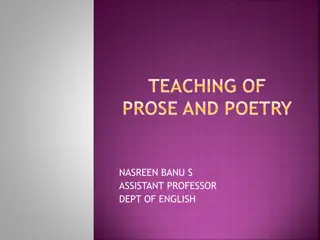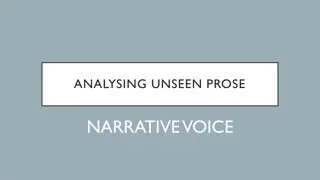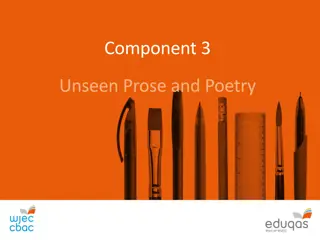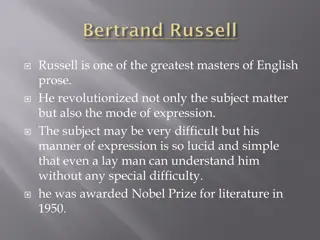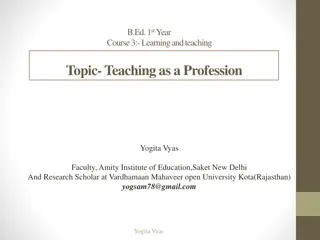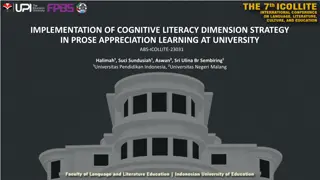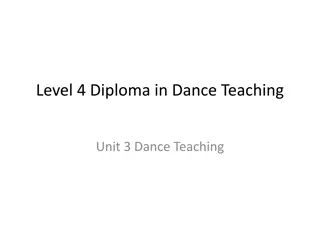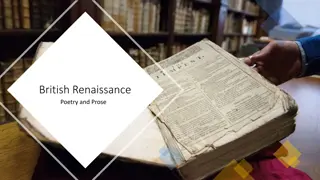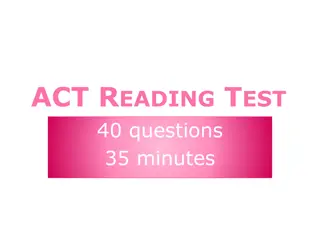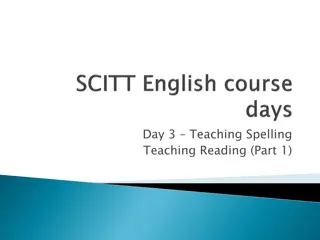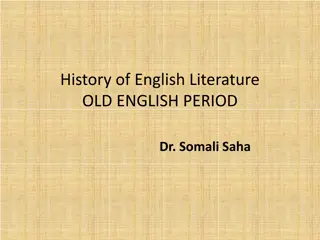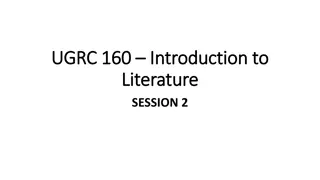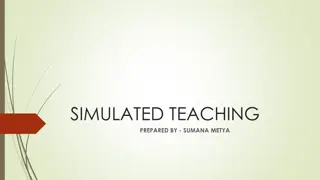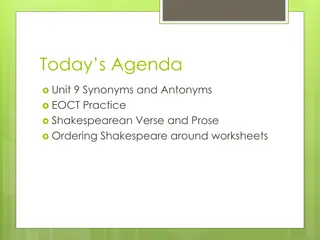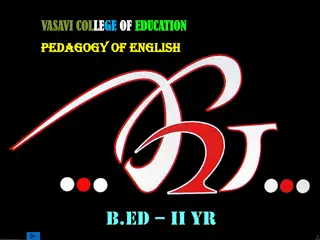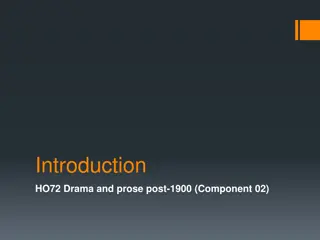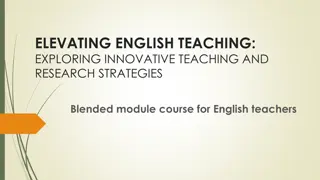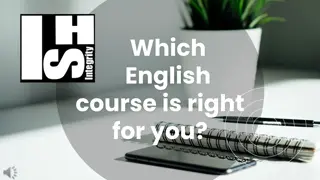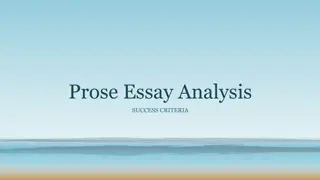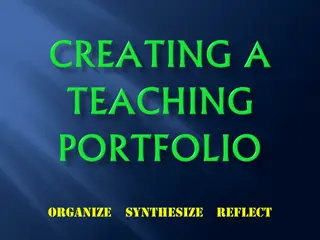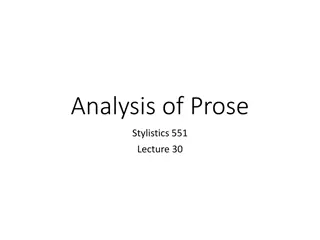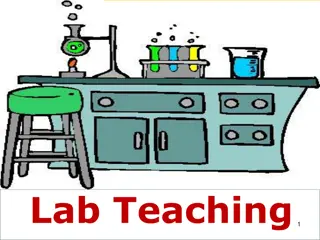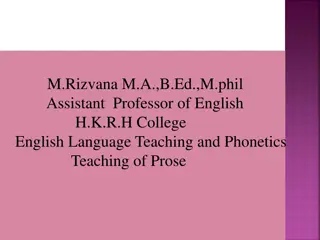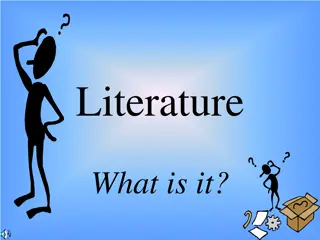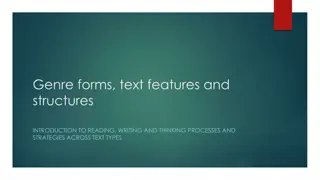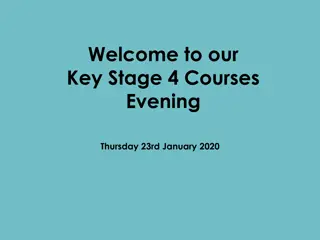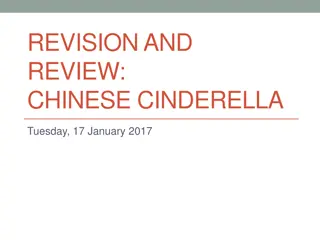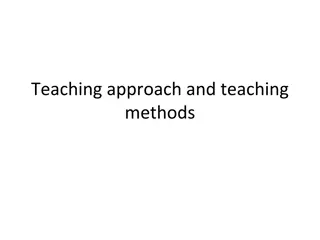Mastering English: A Comprehensive Approach to Teaching Language Skills
Education is not just preparation, but life itself. English language holds a vital place in our educational system and national life. This presentation explores the aims and objectives of teaching English, emphasizing the importance and impact of mastering the language at different education levels.
5 views • 32 slides
Teaching Observation Process and Best Practices
Explore the teaching observation process with a focus on fostering faculty success and improving teaching practices. Learn about pre-observation meetings, separating observation from evaluation, and utilizing observations to spark dialogue about effective teaching. Access resources such as the Teach
7 views • 20 slides
Teaching of Prose and Poetry by Nasreen Banu - A Comprehensive Guide for English Learners
Delve into the intricacies of teaching prose and poetry with insights from Assistant Professor Nasreen Banu. Learn about the aims, general objectives, steps, and alternative methods for engaging students in English language learning. Enhance listening and speaking skills through a structured approac
0 views • 19 slides
Understanding Narrative Perspective in Unseen Prose Narratives
Explore the narrative voice in unseen prose narratives through the analysis of different narrative perspectives, such as homodiegetic and heterodiegetic narrators. Understanding these terms helps in interpreting the impact of perspective on storytelling and themes in literary texts for exam preparat
1 views • 17 slides
Evolution of English Literature: From Old English to Beowulf
The English language, evolving over 1,400 years, transitioned from Old English to Middle English with works like Beowulf standing as a pinnacle of Old English literature. The epic poem tells the tale of Beowulf's heroic feats in pagan Scandinavia, showcasing elements of alliteration, a key literary
0 views • 46 slides
Insights into Unseen Prose and Poetry Analyses
Delve into the assessment of unseen prose and poetry with a focus on introductions, candidate evaluations, and critical engagement. Explore the importance of contextual references, vocabulary analysis, and integration of other readings in shaping responses to literary texts.
1 views • 12 slides
Exploring the Mastery of English Prose: The Style of Bertrand Russell
Bertrand Russell, a Nobel Prize-winning writer, revolutionized English prose with his lucid and simple expressions on complex subjects. Known for his use of long sentences, terseness, allusiveness, and irony, Russell's style combines clarity with deep meanings and continuity of thought. His allusion
0 views • 11 slides
Importance of Teaching English at Different Education Levels
English language holds a significant position in the educational system and national life of India. This presentation by Dr. A. Mary Delphine highlights the aims and objectives of teaching English, emphasizing its importance in India and the modern world. The objectives include understanding the rat
1 views • 32 slides
Co-Teaching in Student Teaching: A Collaborative Approach
Co-teaching in student teaching involves mentor teachers and student teachers working together to plan, deliver, and assess instruction while sharing responsibilities and opportunities for collaborative pedagogy. It is a model that enhances student learning by engaging two teachers actively in the c
0 views • 21 slides
Understanding Teaching as a Profession by Yogita Vyas
Explore the comprehensive module by Yogita Vyas focusing on the nature of teaching, characteristics of effective teaching, importance of teaching as a profession, and qualities of a professional teacher. Gain insights into the teaching profession, its role in society, and the essential skills requir
1 views • 27 slides
GCSE English Literature Exam Overview
This overview provides information on the GCSE English Literature exam structure, content, and assessment objectives for both components. It includes details on the texts studied, such as Shakespeare, poetry, post-1914 prose/drama, and 19th-century prose. Students are assessed on their ability to re
0 views • 23 slides
GCSE English Literature Exam Overview
This GCSE English Literature exam overview provides details on the components, assessment objectives, text choices, and key information for students. It covers Shakespeare, Poetry, Post-1914 Prose/Drama, 19th Century Prose, and Unseen Poetry. Students will engage with a variety of texts ranging from
5 views • 23 slides
Implementation of Cognitive Literacy in Prose Appreciation Learning
The study focuses on the implementation of cognitive literacy dimension strategy in prose appreciation learning at universities. It discusses the impact of technological advances on society and the importance of incorporating moral values in education. The research findings indicate that the cogniti
0 views • 8 slides
Practical Criticism: Analysis and Appreciation of Poetry and Prose
Delve into the world of practical criticism and critical appreciation in BA III English studies with a focus on analyzing and appreciating poetry and prose. Explore the history, significance, and methodology behind this literary practice while gaining insights into interpreting unseen poems. Discove
3 views • 20 slides
Level 4 Diploma in Dance Teaching Unit 3 Overview
In Level 4 Diploma in Dance Teaching Unit 3, the focus is on dance teaching practice. The learner is observed teaching a class, supported by written evidence such as teaching logs and lesson planning. Continuous Professional Development activities are also emphasized. The examination involves teachi
0 views • 8 slides
British Renaissance Poetry and Prose: Influential Poets and Their Works
Explore the world of British Renaissance poetry and prose through the works of renowned poets like Sir Thomas Wyatt, Edmund Spenser, and Sir Philip Sidney. Dive into the evolution of the sonnet form, from Wyatt's introduction of the Italian/Petrarchan sonnet to Spenser's masterpieces like "The Faeri
1 views • 13 slides
Understanding Paragraph Organization in Historical Prose Writing
Explore the D-N-A structure of paragraph organization in historical prose writing, focusing on transitional words, revision strategies, and the inseparable connection between history and writing. Learn how to develop effective paragraphs that guide the reader through your historical narrative.
0 views • 18 slides
Understanding the ACT Reading Test Content
The ACT Reading Test comprises 40 questions to be answered in 35 minutes, covering four categories: Prose Fiction, Humanities, Social Sciences, and Natural Sciences. Each category has a specific percentage of questions. The test evaluates your ability to comprehend various passages, including prose
1 views • 24 slides
Exploring Effective Phonics Teaching and Spelling Conventions through History
Explore the development of effective phonics teaching and spelling conventions through reflective logs and historical context. Discover the impact of phonics sessions on understanding and teaching practices, delving into Old English to modern-day practices. Learn about the evolution of language and
0 views • 57 slides
Teaching Staff Digital Experience Insights Survey Results 2020-21
This presentation provides insights from the Teaching Staff Digital Experience Insights Survey for the year 2020-21. It focuses on key metrics related to technology at the organization, technology in teaching, and the development of digital skills among teaching staff. The survey collected feedback
2 views • 26 slides
Overview of Anglo-Saxon Literature in Old English Period
The Old English period in English literature, dominated by the Anglo-Saxons, showcased a rich tapestry of poetic works, notable authors, and distinct dialects. Key literary features include pagan and Christian elements, as seen in epic poems like Beowulf and Caedmonian Poems. Additionally, the perio
0 views • 11 slides
Understanding Elements of Fiction in Prose Writing
This session delves into the essential elements of fiction in prose writing, covering plot development, characterization, setting, and more. Students will learn to analyze and interpret these elements in stories, with a focus on applying their understanding to a specific short story. Through detaile
0 views • 15 slides
Understanding Simulated Teaching for Effective Classroom Training
Simulated teaching is a powerful training technique that uses role-playing to change student behavior. It helps student teachers practice teaching skills in artificial scenarios before real classroom situations. This method allows for effective feedback, easy implementation, and the opportunity to r
0 views • 11 slides
Understanding Shakespearean Verse and Prose: A Comprehensive Guide
Delve into the intricate world of Shakespeare's language with a focus on prose, rhymed verse, and blank verse. Learn how to distinguish between these forms and their significance in his plays through visual and textual clues. Explore examples of rhymed couplets and heroic couplets, shedding light on
0 views • 24 slides
Comprehensive Pedagogy of English for B.Ed Second Year Trainee Teacher at VCE Hr. Sec. School
Enhance English teaching skills for 9th grade students focusing on prose literature and language development. Objectives include improving pronunciation, vocabulary, and language skills through a structured curriculum using various teaching aids.
0 views • 9 slides
Study of Modern Drama and Prose Post-1900
This component focuses on the study of a modern play (The History Boys) and a modern prose text (The Great Gatsby). Learners explore cultural and contextual influences on writers and readers, analyze literary texts, demonstrate understanding of contexts, and make connections across texts. The examin
0 views • 23 slides
USC Teaching Excellence Initiative Progress Report
The USC Teaching Excellence Initiative highlights progress in developing a School Teaching Plan with five key elements, focusing on faculty-led processes, defining teaching excellence, supporting faculty development, evaluating teaching excellence, and rewarding outstanding performance. The Center f
0 views • 6 slides
Elevating English Teaching: Blended Course for Innovative Strategies
Explore an innovative blended course designed for English teachers to enhance teaching quality through online resources, digital tools, action research, and active learning strategies. The course includes modules on applying digital tools, action research in English instruction, and active learning
0 views • 15 slides
Choosing the Right English Course for Your HSC: Advanced, Standard, or Studies?
When preparing for the HSC, selecting the appropriate English course is crucial as it is compulsory. Options include Advanced English, Standard English, and English Studies, each offering unique benefits. Advanced English challenges students with higher-order thinking skills, while Standard English
0 views • 25 slides
Exploring English Literacy in a Brave New World
Delve into the realm of English literacy beyond traditional syllabuses and evaluations, as Geoff Barton discusses the evolving landscape of teaching English and its impact on students' progress and perception. The presentation covers crucial aspects like distinctive teaching methods, unique offering
0 views • 86 slides
Prose Essay Analysis Success Criteria
Explore the steps involved in analyzing a prose essay for success criteria. From reading the exemplar essay to developing criteria and reflecting on improvement strategies, this process aims to enhance writing skills and achieve measurable goals in future essays.
0 views • 6 slides
Enhancing Your Teaching Portfolio with Effective Strategies
Empower your teaching portfolio by organizing, synthesizing, and reflecting on essential elements like syllabi, exams, and teaching philosophy. Write a captivating introduction, update your curriculum vitae, and craft a personal statement to highlight your qualifications and career goals. Share your
0 views • 10 slides
Understanding Stylistic Analysis in Literature
Stylistic analysis in literature involves examining linguistic features like lexis, grammar, foregrounded elements, and context to distinguish between literary and non-literary prose. While poetry allows for whole text analysis due to its brevity, prose analysis often focuses on selected extracts fo
0 views • 16 slides
Exploring the Role and Objectives of Laboratory Teaching
The content delves into the various perspectives on laboratory teaching, its aims, pedagogical levels, and common challenges faced. It discusses specific aims of laboratory teaching, including familiarization with equipment, teaching experimental work attitudes, and training in observation and deduc
0 views • 32 slides
Effective Strategies for Teaching English Prose - A Comprehensive Guide
Teaching English prose is a fundamental aspect of language education, focusing on reading comprehension, vocabulary enrichment, and writing skills. This guide covers the objectives of teaching prose, including enhancing comprehension, pronunciation, vocabulary, and writing abilities. It emphasizes i
0 views • 21 slides
Exploring the World of Literature
Literature encompasses various genres such as poetry, drama, and prose, each with unique elements and characteristics. It provides a platform for expressing ideas, emotions, and stories in a creatively compelling manner, capturing the interest of readers for generations. Discover the artistry of poe
0 views • 12 slides
Understanding Genre Forms, Text Features, and Structures in Reading, Writing, and Thinking
Explore the world of genre forms, text features, and structures in this engaging session. Learn to classify different texts, recognize generic features, and understand the main literary genres including prose, poetry, and drama. Delve into the nuances of prose writing, the musical quality of poetry,
0 views • 22 slides
Key Stage 4 Courses Overview: GCSEs, Qualifications, Curriculum, and Examinations
Explore the Key Stage 4 courses offered, including details on GCSE grading, J Scale for GCSE comments, qualification types, Year 9 curriculum, Year 10 and 11 curriculum, GCSE English examinations, and science options. Gain insights into English Language, English Literature, Maths, Science, Humanitie
0 views • 29 slides
Analysis of Structure and Form in Chinese Cinderella
Explore the internal organization and prose style of the text "Chinese Cinderella" through an examination of structure, narrative form, dialogue usage, and character development. Dive into how the sections are divided, the use of dialogue to define characters, and the indicators that stand out in th
0 views • 6 slides
Effective Teaching Approaches and Methods for Educators
Characteristics of good teaching include being sensitive to students' abilities and needs, using effective teaching methods, and integrating interactive teaching approaches. Teachers should structure their teaching in relation to students, be familiar with the curriculum, and develop methods that en
0 views • 40 slides


